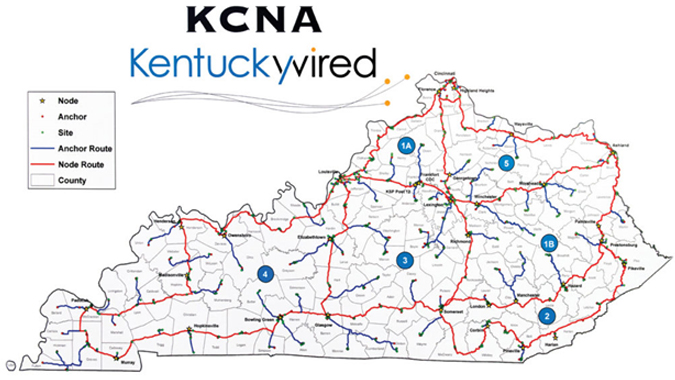
photo credit: Kentucky Communications Network Authority
| Location | Kentucky (statewide) |
|---|---|
| Project Sponsor / Borrower | Kentucky Communications Network Authority |
| Program Areas |
|
| Value Capture Techniques | Right-of-Way Use Agreements |
| Mode | Telecommunications |
| Description | KentuckyWired is a 3,200-mile statewide network of major fiber optic cable (also referred to as the "middle mile" or backbone) to provide broadband internet connectivity. The network will be open access, allowing local public or private Internet service providers (ISPs), cities, partnerships, or other groups to connect to the network and extend services to local communities, i.e. the "last mile" to individual homes and businesses. Critically, connectivity will include universities, state government buildings and community and technical colleges. Improved cell phone coverage is also anticipated as part of the initiative. Approximately 85% of the network will be aerial and 15% underground. The needs for improved broadband connectivity in Kentucky had been apparent for some time. In 2017, the state ranked 47th in the country in broadband speeds and capacity, which has been a major disadvantage for attracting and growing new job and education opportunities. High costs had prevented] private carriers from building out a statewide network. With KentuckyWired, the state is responsible for building out the middle portion of the fiber network and created the Kentucky Communications Network Authority (KCNA) in 2015 to manage the initiative. Ultimately, the state will earn revenue through wholesale leasing of access to the network from satellite companies, large companies, and smaller broadband providers. The origins of the project date back to 2013 when multiple state agencies had submitted budget requests for increased funding to support fiber networks. It became apparent that the state should develop a coordinated approach to providing this fiber capacity. At the same time, the Shaping Our Appalachian Region (SOAR) initiative, created in 2013 by the then-Governor and a Congressman recommended the development of reliable, accessible, and affordable high-speed broadband. Through a Request for Information process targeting incumbent providers and potential partners, the state determined the P3 concession model to be the best approach for delivery. The state reached an agreement in 2015 with a consortium led by Macquarie Capital to design, build, finance, operate, and maintain the network over 30 years in exchange for availability payments from the state. Availability payments will be funded in part by budget appropriations already anticipated for existing Internet services to the state. The agreement includes two equipment refreshes prior to years 11 and 21. The upgrade cost will be fully compensated through an adjustment in the availability payments so that the state effectively bears the risk of the refresh. The concessionaire will also share in revenue from the leasing of access to the network. The complexity of the project and number of entities involved has impacted the aggressive construction schedule established under the initial agreement. Because of delays in obtaining some pole attachment agreements (agreements to allow the project to use existing utility poles owned by various third parties) and easements to bury cables underground on privately-owned land, construction completion has incurred over two years of delay. Approximately 70 telecommunications, electric and municipal utilities across the state are important partners for access to poles. As of January 2018, KCNA had pole attachment agreements for nearly 90 percent needed statewide. The state reached a settlement with the concessionaire in mid-2018 to cover those costs, as they were deemed supervening events according to the concession agreement. |
| Cost | $324.4 million (closing costs and initially estimated site preparation, construction costs, and third-party oversight) $88 million (costs adjustment agreement reached to cover overruns for utility pole attachment agreements) |
| Funding Sources | Public funding
Concessionaire's financing sources for construction
|
| Project Delivery / Contract Method | Design-build-finance-operate-maintain Availability Payment Concession (30 years) |
| Private Partner | Macquarie Capital - Concessionaire Equity investors at financial close
Equity investors as of October 2018
Design-builder - NG-KIH DBLLC Contractors
Fujitsu Network Communications Inc. - Network design, equipment, operations and maintenance, and equipment refresh |
| Project Advisors / Consultants | To the State of Kentucky
To the Concessionaire
|
| Lenders | Bondholders |
| Duration / Status |
|
| Financial Status / Financial Performance | Closed |
| Innovations |
|
| Related Links / Articles |
"Infrastructure: Statewide Broadband on Track for 2019-20" (The Lane Report, July 2, 2018) |
| Contacts | Phillip Brown |